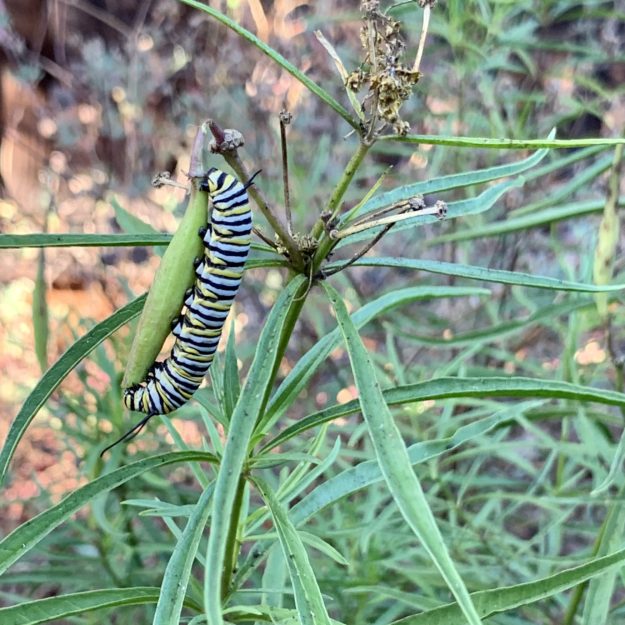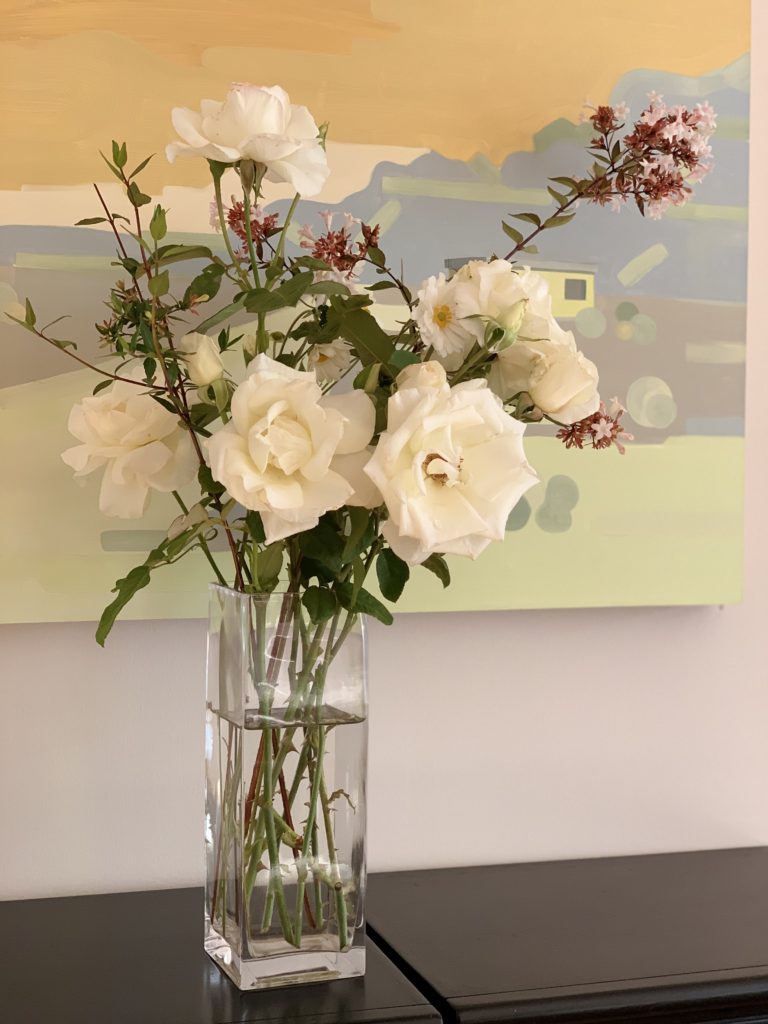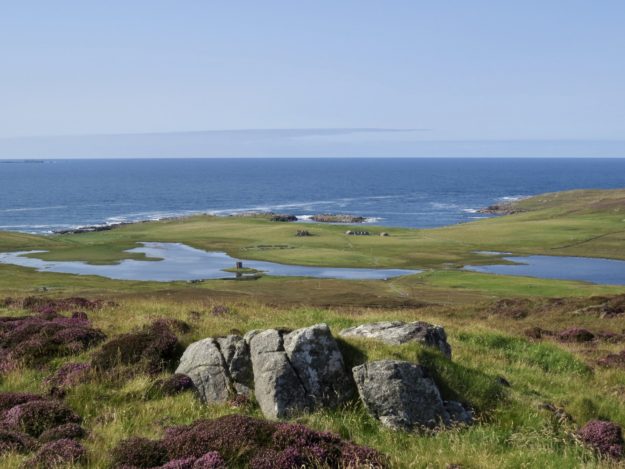
I garden. While I garden, despite my best intentions, I think. Herewith:
- In gardens, as in life, some people love research. Some, do not. If, for example, you like to build mental models from 20% of all relevant information, and act on that, you’ll run into a lot you don’t know and you won’t know you don’t know it until you get there. But, you won’t be bored and I hate boredom the way others do confinement, or the spotlight. All approaches cost.
- Patience rewards. Remember when I planted a little milkweed in my side yard? (A project for which I will point out I did very little research?) And right away I found two caterpillars on my first two plants and thought I was golden, as we used to say? I planted more the next year, but hosted only one butterfly and no caterpillars at all. This year, although the milkweed had taken over by now, rampaging through vervain and sage, by September I still hadn’t seen a single flap of an orange-veined wing. So I started to pull it all up, sweating, yanking, only to find, as I raised one stalk, a great striped instar. I was horrified at my mistake.
- Impatience can be mitigated. I put the caterpillar down amidst another milkweed stand still in the ground. The next morning it was eating seedpods, see photo. I was thrilled. Saved from my precipitous act.
- Patience still required. Then the day after that I went out to find my caterfriend again and, gone. Either eaten by a jay or crawled off to form its chrysalis hanging somewhere, unseeable. I’ll never know. I will however wait until November to yank milkweed next year, and if I do find a caterpillar maybe even spread out a piece of tulle to protect it. Thank goodness for the seasons and the turning of the earth. That which ages us may also offer a do-over.
- Start the large and universally good. Trees are the deep moral values of a garden. Situate them first, and often.
- “Grow where you’re planted” is absolutely terrible advice. Much better to plant yourself where you can grow. Ferns don’t survive the midday sun; nasturtiums bloom poorly in rich soil. Know these things about yourself. And keep your light source in mind. You can amend soil, or replace water, but establishing shade takes time and money and you cannot create sunlight. Some things are out of our control for goodness’s sake.
- There’s a time to struggle to make flowers and grow and get sick but make more flowers and there’s a time to let someone carefully collect your best parts and put them in a vase, to admire. Especially towards the end of our season. White roses, people, same same.

- Nature is a complex system; sometimes most of the work is done by the scrubby bits. Hydrangeas use a lot of resources and contribute nothing except to people who like noticeable flowers. Dead leaves, on the other hand, put critical nutrients back into that same soil where the hydrangea blooms so freely.
- We as a species are an interruption in the natural world. I remain unconvinced that nature can survive our unnatural abilities unless we act with care. Which brings me to a request.

This is Scolpaig, on North Uist. You may remember I have a friend who lives here, I visited a few years ago. A consortium wants to build a rocket launching pad on the site, right next to sensitive micro-ecosystems. I ask you to go and sign this petition protesting the plan. There’s no registration, nothing but a signature and email address required. More information here.
Have a wonderful weekend. Yours in thankfulness and in not knowing what I don’t know.

33 Responses
Your caterfriend is beautiful indeed
Tending one’s own garden can be both phylosophycal and worthwhile. And soothing too!
Have a wonderful weekend
Dottoressa
P. S. This thing with North Uist is insane
@Dottoressa, Insane. Exactly. Money and power warp so many decent people’s thinking.
I would have to echo Dottoressa – putting a space port there is totally insane. Ack, I just can’t think about anymore environmental destruction. First Utah and Alaska and the Amazon, and now this.
@Allison, Yes. But this is a small thing, on a small island, so maybe just maybe we can make a difference. Or so I hope.
Signed. Like Local Hero, what the hell makes them think that’s a good idea?
@Annie, Good simile! And agreed:).
Thank you for alerting me to this ! I’m concerned that I didn’t already know……
@Rukshana Afia, You’re welcome. And they’ve only just begun to collect signatures. Not too late.
Thank you for a lovely post.
Happy weekend.
@MaryAnne, You are very welcome. I hope you have a happy weekend too:).
The petition is signed. I have a lovely neighbor who I told that I was worried about global warming. His response, “Yes, but don’t you think if there is nobody here for a thousand years it will all go back”. (Keep in mind he has a six year-old daughter).
Your garden observations which are keen and accurate. Only a few Monarch butterflies in my husband’s milkweed this year.
Thank-you for keeping me alert.
Luci
@luci, Thank you for signing. And I agree with your neighbor, nature is resilient once we leave it alone. But exactly that, the children.
Love your garden musings, and your caterfriend is beautiful. How often I go in half-baked, despite research. I never know what I will encounter until I am in the midst of it. Or so it seems in the garden anyway. Good for humility, and by extension humanity. I am sure that many mistakes await me. I too have signed….
@Mardel, “Good for humility, and by extension humanity…”
I am looking so forward to seeing how your garden evolves this year and next.
Except for having someone landscape around my 100-year-old Little House when I lived on a ranch… I took care of it after that… this is the first time I’ve really done it all myself, and I’ve discovered all of your points to be true. Frustratingly true. I have areas I will “do over” in the early spring. The biggest impediment to my garden is Annie, my dog. She has a love/hate relationship with Mr. Lizard and Mr. Squirrel and she likes nothing better than taunting them. I’ve fenced things off from her, but clever girl that she is… She always finds a way past it, which isn’t good for my plants.
@1010ParkPlace, Oh boy, adding a dog would be a whole other dimension! I hadn’t even thought about that. I bet Annie loves to go out:).
Have finally admitted to myself that although I like the “idea” of gardening, I don’t like doing the work. Our new home lends itself to a very drought resistant, easy “garden” and I’m thrilled. In my previous home I planted tons of milkweed and had nothing. My daughter grows milkweed on a rooftop deck and gets tons of caterpillars and butterflies?
Petition is signed. Thanks for the alert.
@KSL, I love the image of a stand of milkweed on a rooftop, high enough for the monarchs to find it. You know what, there are many things I like the idea of and it really is a relief I don’t like doing the work;). For me it’s decorating my house believe it or not! I am so glad you like your new garden.
Thank you for offering me another opportunity to help try to save our environment, here, in Scotland, everywhere. We Share the Earth.
@Jacqueline, Thank you for helping. Share it we do. <3
Thank you for your beautifully written garden thoughts. I read them aloud to my 86 year old mother who also planted milkweed a few years ago. She is very ill, and received some peace from your words.
@Kathy Smith, I didn’t know it when I started, but now I think I must have been writing it for your mom and I send her my thoughts on peaceful mornings and the sound of birds in the trees.
Darling Lisa,
I love your paradoxical post today. Since this post can appeal not only to real life gardeners but intentional ones too, I resonate with all of your points. Interestingly, I re-read your post through my grandmother’s eyes, because of her love of gardening. How’s that for a psychological trip? My grandmother – my idol and helpful co-creator of my sane mind – was a keen gardener up until the age of about 96. The family decided she need to be moved to full time care, while she, protesting loudly about why did they put her in a place with all these ‘old people’, lived to be 98.5 years old, I largely put her longevity, love of life and wisdom, down to her love of gardening, as, I am sure, it gave her the chance to heal from deep wounds she endured during her lifetime (2 world wars among many). Two of my earliest childhood memories of Grandma’s garden (circa 3 years old): being allowed to make real mud pies, and being shown how to pour boiling water down an ant’s nest. More than anything, it is remembering the atmosphere that accompanies these memories – the peace that was being in her company. She herself was the epitome of patience. So patient. Maybe she worked out her frustrations on her runner beans?
My take away from this piece: a few minutes of blissful reminiscence (thank you); and a nod of the head to point number 6. Surely point 6 is also where the patience comes in? Sometimes you have to attempt to try and put roots down in untenable soil until your opportunity to move comes along. Patience is not apathy. My challenge with this piece is number 7. Such internal resistance. In the words of Regina Spector in her song “On the Radio”:
You peer inside yourself
You take the things you like
And try to love the things you took
Blessings, and may you see orange veined wings some time this week and continue to admire that gorgeous vase of flowers..
TJ Xxxxxx
@TJ, I can only aspire to be someone like your grandmother, but, aspire I will. Thank you for the story. And you make a good point, that sometimes you cannot find fertile ground and you have to hunker down in the rocky cracks and wait until summer comes and you can move.
Number 7 is really worth the work. I promise you.
My experience is the garden is a work in progress. Change is constant. Flexibility is the key to success. Embrace the beauty of nature and all that it has to offer.
@Susan, I need to work on giving up the idea of completion. Just as soon as I get the fall planting finished that is;). Thank you.
Hello Lisa, You really packed a lot into a short post. I just signed the petition. Although I did not research the other side, it is better to err on the side of caution. I remember all the promises to protect the environment when the Alaska pipeline went up. Your story of the caterpillar is the perfect reason why we should not be too quick to tamper with nature!
Today’s post also strikes me on a personal level, since I indeed “like to build mental models from 20% of all relevant information.” That’s what makes you mentally alive, and builds a fertile ground for creative hypotheses that culminate in those “eureka” moments.
–Jim
@Parnassus, Thank you Jim. And I am happy to hear from a fellow modeler. We are the champions of creative hypotheses, to be sure:).
I’m thinking of “the butterfly effect,” and imagining that the post you built partially around your elusive friend may flap wings boldly enough to stop rocket launches across the ocean. . . .
My garden now doesn’t sink satisfyingly into the earth as yours do, but I’m still always tickled and impressed by how good it is for breathing and thinking and just being. . .
@Frances, Ah if all of has can affect the world so well. I love your garden – you brought the ground with you into the sky.
You have learned some lovely lessons, especially (from my point of view): “That which ages us may also offer a do-over” and “Plant yourself where you can grow.”
As I compare my own gardening heroes and outlaws here in the Lower Midwest to yours in NoCal, another possible lesson appears: “Our choice of geography defines us.” For instance, here monarchs appear in spring in abundance and leave for southern climes only in late fall when they cannot delay the trip one more day. And during that long growing season, here hydrangeas don’t burden other plants or this gardener–they just reward.
Or perhaps that’s just a corollary to “Plant yourself where you can grow.”
@Ann in Missouri, “And during that long growing season, here hydrangeas don’t burden other plants or this gardener–they just reward.” That is a perfect example. Thank you.
That caterpillar looks to be very hungry. :)
Comments are closed.